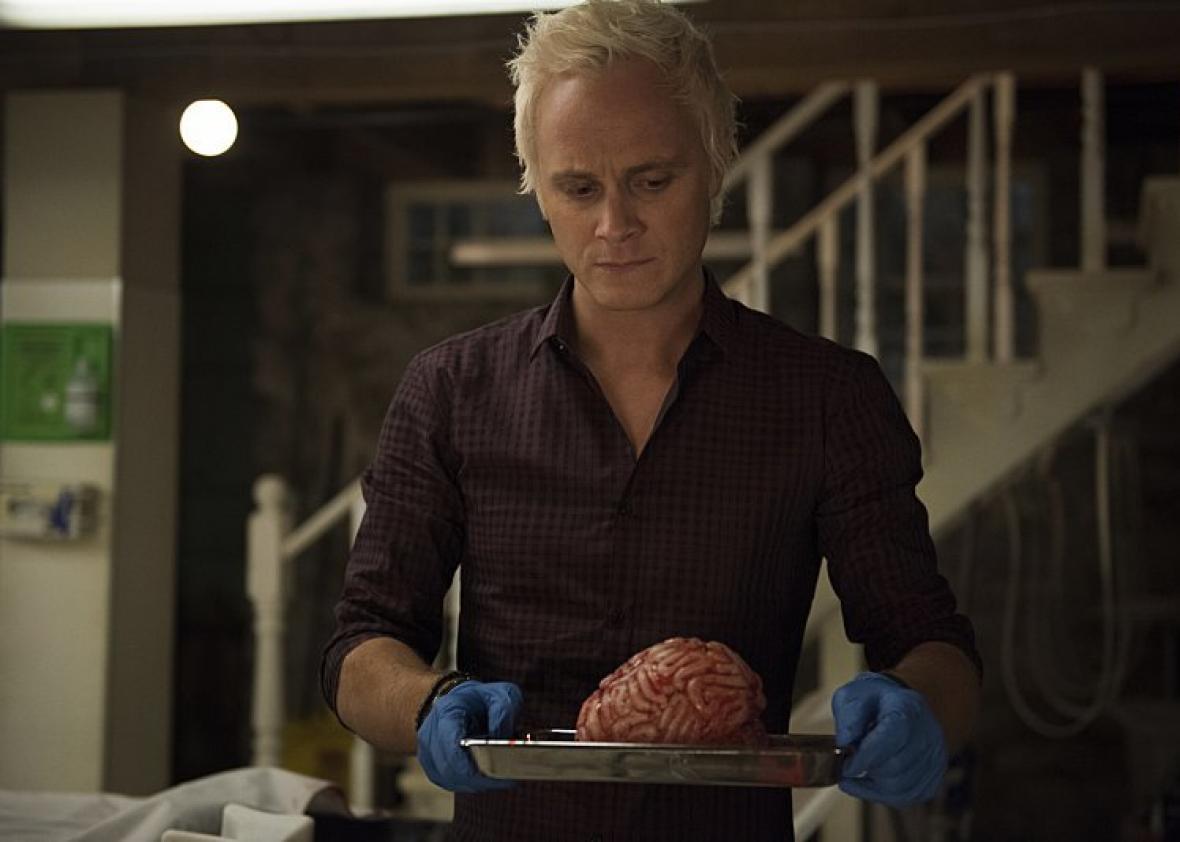Zombies are boring. Or, at least, zombies make for boring characters. (Could you have a conversation with a zombie? What would its motivation be, besides “brains”?) What makes zombie stories interesting is the way human characters respond to the hordes of the undead; even more than most monsters, the undead exist as a sort of projection screen for human existential anxieties. Other monsters can be exciting and mesmerizing and even imbued with pathos. (Like, say, vampires, or Frankenstein.) The prospect of a zombie engaging in normal human activities is, essentially, a source of comedy. While the world’s biggest zombie franchise shows no sign of losing steam in the Nielsen ratings, it continues to frustrate viewers and critics by refusing to tell interesting zombie stories. And that’s just part of what makes The CW’s iZombie, which aired its second season finale Tuesday night, so infectious.
On paper, iZombie looks like a case of painfully stitched-together writing, cannibalizing several genres whole. When Olivia “Liv” Moore (Rose McIver) gets scratched by a zombie and develops an intense hunger for brains that give her visions of the corpse’s memory when eaten, she does what any person with supernatural abilities on network television would do: solve murders. This, admittedly, sounds like it would make a terrible show. But executive producers Rob Thomas and Diane Ruggiero-Wright have found a way to blend a bunch of different genres together in a genuinely compelling way. There’s the personality-of-the-week element of something like Dollhouse, combined with several tortured romances (this is The CW, after all), the legal tick-tock of a cop show, and, of course, zombies.
For a zombie show, iZombie has relatively low (i.e. nonapocalyptic) stakes: Rather than an immediate outbreak-level threat, there’s a sort of individualized ticking time bomb, as zombies that go too long without eating brains devolve into the ferocious, gnarly-faced biters we all know and love. This isn’t a totally new innovation for the zombie genre—the show is, after all, loosely based on a comic with a similarly humanoid zombie. The movie Warm Bodies, a rom-zom-com about a zombie who becomes a real boy through the power of love, has been pitched as a major influence on the show.
But the series format has allowed iZombie to flesh out what it means to be a zombie in a way that no other piece of walking-dead entertainment has. This has primarily happened through character relationships, particularly as Liv and her ex-fiancé Major Lilywhite (Robert Buckley) go through several on-again, off-again stages as Major becomes a zombie, is temporarily cured, then becomes a zombie again. Its closest analog is probably vampirism in Buffy the Vampire Slayer, where, after being introduced to Sunnydale with the mandate that all vampires deserve to die, we get a romantic hero, an anti-hero who becomes one of the best characters on the show—and an entire spinoff that interrogates the viewer’s relationship to monstrosity. (The biggest threat to humanity, it turns out, comes from lawyers.) But after only two seasons, iZombie is so confident in its characters that when Liv’s detective partner Clive finally finds out she’s a zombie, the show simply plows through the revelation in favor of more interesting storylines.
Over the course of its run, iZombie has used the relatively slow spread of the zombie virus as a way of establishing a sense that, in this world, being a zombie is an unfortunate lifestyle rather than a full dehumanization. The zombie epidemic starts at one singular, memorable party and is propagated gradually, primarily to young, attractive people. (When Liv’s zombie-hunting ex-boyfriend Major discovers that a middle-aged guy is a zombie, it comes across as a shock, and it’s meant as one, precisely because uncool dads aren’t supposed to be down with Z.) At the beginning of the second season, there are a few hundred of them living secretly in Seattle, more like a cool and elite subculture than an existential threat to humanity.
This is important, because being a zombie has a strong aesthetic component, and it isn’t cheap: You have to regularly dye your hair, tan your skin, buy lots of hot sauce to activate what’s left of your taste buds, and, uh, acquire brains. (If you’re not a medical examiner, this costs upwards of $20,000 per month.) And like most hip subcultures, this one is been co-opted for evil ends by a massive corporation—in this case, energy drink company Max Rager, whose CEO Vaughn Clark (Steven Weber) is the primary antagonist of the second season.
In the insanely action-packed second-season finale, at least one officer of the law discovers the existence of zombies, the entire Max Rager staff is consumed by zombies, and singer Rob Thomas gets consumed in the crossfire. In the closing moments of the episode, we also get a look at the big bad for Season 3. The military contractor that had purchased Max Rager, ostensibly for the benefits of its energy drinks, is composed entirely of the undead—and they’re trying to organize. Seattle, their leader tells Liv, will become the capital of a new zombie nation. A mass political conflict involving an actual war, where the zombies have leaders and tactics and cellphones? That would never happen in a Romero movie or The Walking Dead. But on iZombie, it’s business as usual.
